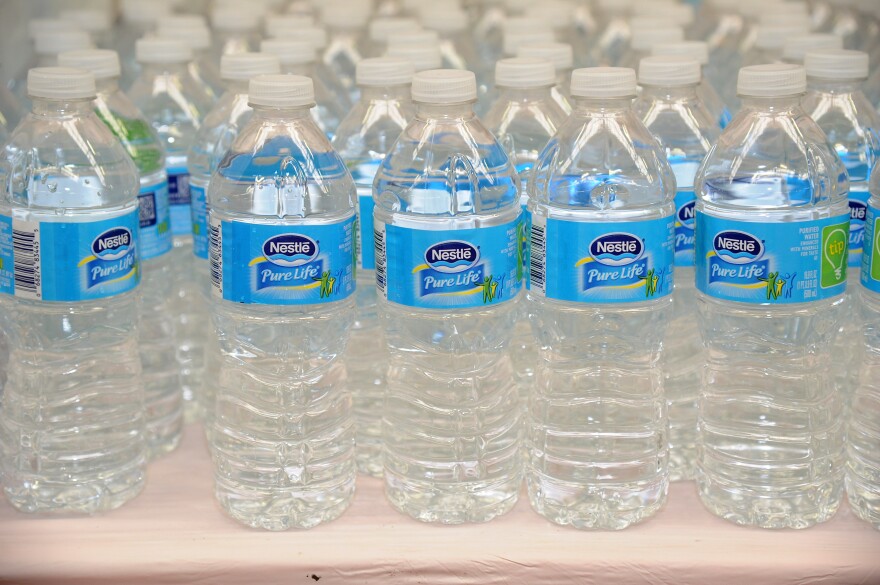This story is free to read because readers choose to support LAist. If you find value in independent local reporting, make a donation to power our newsroom today.
This archival content was originally written for and published on KPCC.org. Keep in mind that links and images may no longer work — and references may be outdated.
Can Nestlé, Coca Cola help enviros fight drought?

When the Station Fire swept through the San Gabriel Mountains in 2009, it opened the door to an unwelcome visitor: Arundo donax, or giant reed. The plant, which sucks up water five times faster than native vegetation, colonized stream beds that had been burned by the fire.
Now, a new restoration project hopes to destroy the plant and get more water back in local mountain streams. It’s one of a number of ecological projects around California funded by a group of unlikely allies: environmental organizations and some of the largest food and drink companies in the world, including Coca Cola, Nestlé and Anheuser-Busch.
The new group is called the California Water Action Collaborative, and the goal is to work collaboratively to protect and increase water supply in California. In addition to the San Gabriel project, CWAC is working on groundwater recharge on farmland in the San Joaquin Valley and a forest restoration project in the northern Sierra Nevada.
Wes Swaffar is the senior manager of ecosystem services for the National Forests Foundation, which is managing the San Gabriel stream restoration. He said the projects assist with corporate responsibility goals and also have a direct benefit to companies that draw on California’s ground and surface water to make their products. That includes Nestlé and Coca Cola, which both have multiple bottled water plants in California (only Coca Cola is funding Swaffar’s project).
As the drought in California has dragged on, environmental groups have been asking whether it makes sense to bottle water here. And last fall, a trio of environmental groups sued the US Forest Service over allowing Nestlé to continue bottling water from the San Bernardino National Forest on what they argued was an expired permit.
Nelson Switzer, the chief sustainability officer for Nestlé Waters North America, said the company's decision to get involved with CWAC has nothing to do with the negative publicity it received. He said conversations about what ultimately became CWAC first began in 2014, prior to the lawsuit and media attention over the company’s bottling plant.
“We take our responsibility as water stewards very seriously,” he said. “We are interested in increasing water supply for all of California.”
But for Ileene Anderson, a senior scientist with the Center for Biological Diversity, which sued the USFS over Nestlé's bottled water permit, said increasing streamflow is a self-serving goal for the company.
"If the restoration project is about actually restoring habitat, I think that's a noble thing," she said. "If it's just to have greater water flow coming down from the Station Fire area, I'm not sure that that actually heals the wounds that have occurred in that landscape."
She also questioned whether another one of CWAC's projects in Northern California would have the desired outcome. In the headwaters of the American River in Northern California, The Nature Conservancy, which owns the land, is proposing to do selective logging and prescribed burns to see if fewer trees on the land will result in more water flowing downhill into rivers and streams. The nonprofit says it could boost stream flow by up to 6 percent, according to its website.
In a previous interview, Roger Bales, a hydrologist tasked with monitoring the project, said these benefits may be short-lived if trees or other vegetation grow back and begin using the water again. “It’s not a guaranteed cause and effect,” he said.
Collaborations between government, non-profits and private companies have become more common as public funding has been slashed and awareness has grown in the business community about corporate sustainability, according to Swaffar, who had no comment on Nestlé's involvement.
“There’s a tremendous public benefit to these projects because we all rely on our national forests for water,” he said. “When we have private companies engage with us on these issues, they’re not just benefitting their business interests, they’re really benefitting a national resource.”
This story was edited on 10/21 for clarification on which companies are funding Wes Swaffar's project.







